
As concerns about climate change and environmental sustainability grow, finding alternatives to traditional gas boilers has become increasingly important. In this informative guide, we will delve into various sustainable heating solutions that offer an eco-friendly and efficient alternative to gas and oil boilers here. By the end of this article, you will have a comprehensive understanding of these various oil boiler and gas boiler alternatives and be empowered to make a greener choice for your home.
When it comes to a renewable heating system for our homes, it’s essential to consider the environmental impact. Alternative heating systems offer numerous benefits over gas boilers. They provide energy efficiency, reducing both your carbon footprint and energy costs. Additionally, these renewable heating systems promote the use of renewable energy sources, contributing to a sustainable future. By embracing these green alternatives to gas, you can make a positive impact on the environment while enjoying the advantages of efficient heating.
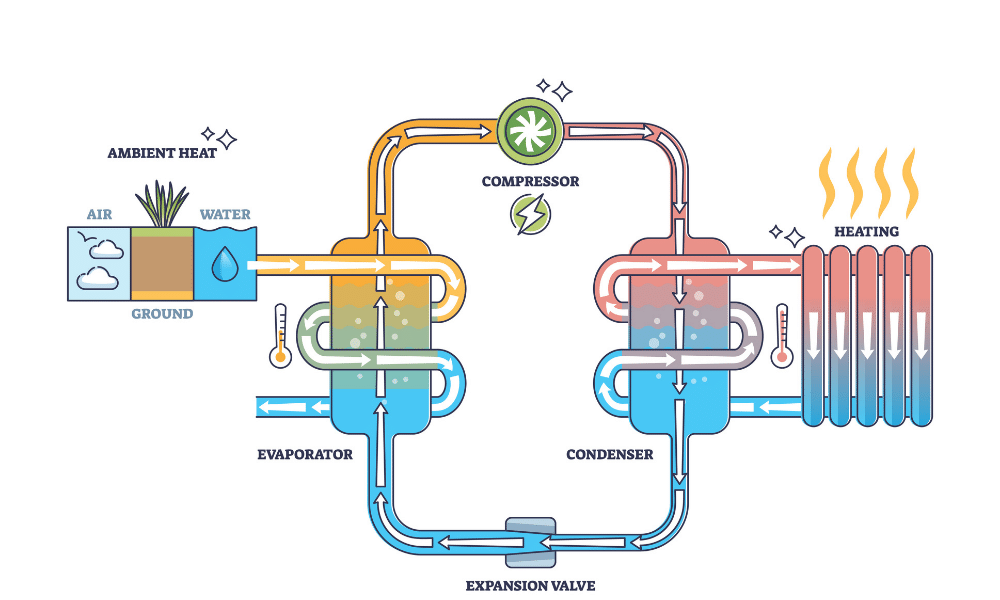
One of the most popular and efficient alternatives to gas boilers is the heat pump. By harnessing renewable energy from the air, ground, or water, heat pumps can provide both heating and cooling for your home. They can replace gas boilers and work by transferring heat from one place to another, rather than generating it from scratch. Heat pumps are highly energy-efficient and can reduce your carbon emissions significantly. Explore the different types of heat pumps available including air source heat pumps and ground source and consider their suitability for your home’s heating needs.
Pros:
Energy efficient. Heat pumps can be up to three times more efficient than traditional heating systems, meaning you can save money on your energy bills.
Environmentally friendly. Heat pumps do not produce any emissions, making them a more sustainable option for heating and cooling your home.
Low maintenance. Heat pumps require very little maintenance, making them a low-cost option to own and operate.
Versatile. Heat pumps can be used for both heating and cooling, making them a year-round solution for your home’s comfort needs.
Long lifespan. Heat pumps can last for 20 years or more, making them a wise investment for your home.
Cons:
Initial cost. Heat pumps can be more expensive to install than traditional heating systems.
Not suitable for all climates. Heat pumps may not be as effective in very cold climates.
May require backup heating. In very cold climates, you may need to have a backup heating system, such as a gas boiler, in case the heat pump is not able to keep up.
Can be noisy. Some heat pumps can be noisy, especially when they are first turned on.
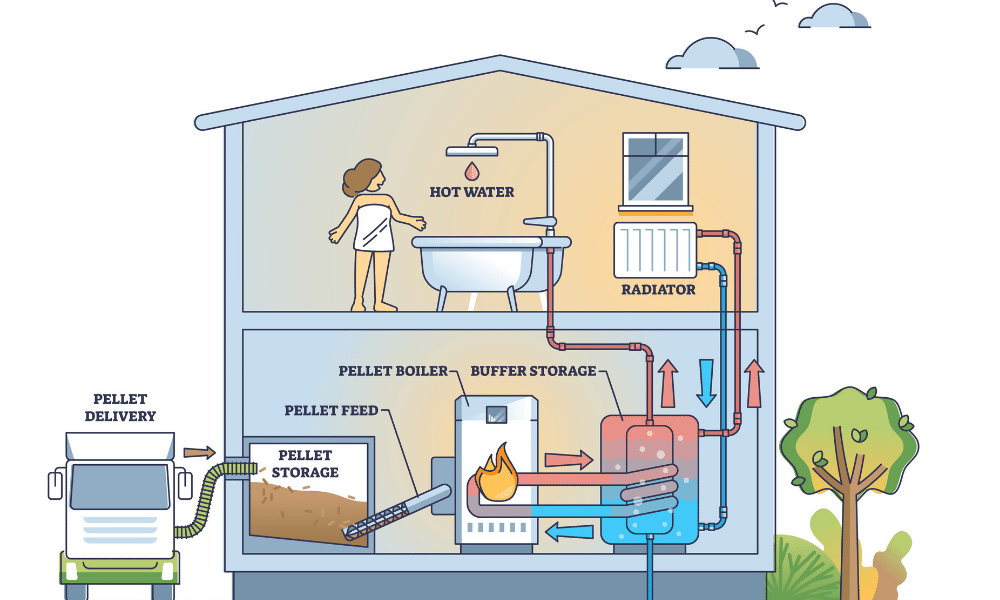
Another sustainable low carbon alternatives and heating option is biomass boilers, which utilise organic materials such as wood pellets or logs as a fuel source. Biomass boilers are considered carbon-neutral since the carbon dioxide released during combustion of biomass boiler is offset by the carbon absorbed during the growth of the biomass fuel. These boilers are suitable for both domestic and commercial use and offer a renewable and environmentally friendly heating solution.
Here are some of the pros and cons of biomass boilers:
Pros:
Renewable energy source. Biomass is a renewable energy source, meaning it can be replenished over time. This makes it a more sustainable option than fossil fuels, which are a finite resource.
High efficiency. Biomass boilers can be very efficient, meaning they can produce a lot of heat with a small amount of fuel. This can save you money on your energy bills.
Low emissions. Biomass boilers produce lower emissions than fossil fuel boilers, making them a more environmentally friendly option.
Government incentives. There are a number of government incentives available for biomass boilers, such as the Renewable Heat Incentive (RHI). These incentives can help to offset the cost of installing a biomass boiler.
Cons:
Initial cost. Biomass boilers can be more expensive to install than traditional fossil fuel boilers.
Storage requirements. Biomass fuels need to be stored, which can take up space.
Maintenance requirements. Biomass boilers require more maintenance than traditional fossil fuel boilers.
Not suitable for all climates. Biomass boilers may not be as effective in very cold climates.
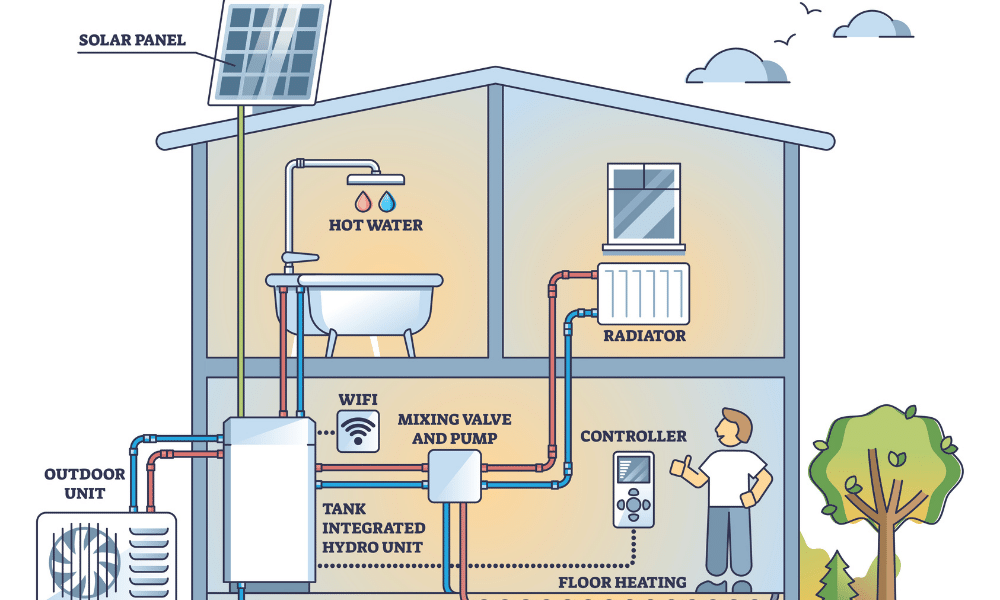
Solar thermal electric heater systems known as solar power hot water systems are an innovative alternative to gas boilers that harness the power of the sun to heat water for domestic use. By installing solar panels on your roof, you can have solar thermal panels that capture the sun’s energy and convert it into usable heat. Solar powered electric heating systems are highly efficient and can significantly reduce your reliance on traditional heating methods. Embrace this sustainable technology and tap into the abundant renewable energy provided by the sun as a gas boiler alternative.
Here are some of the pros and cons of solar thermal systems:
Pros:
Renewable energy source. Solar thermal systems use the sun’s energy, which is a renewable resource. This makes them a more sustainable option than fossil fuels, which are a finite resource.
Energy efficiency. Solar thermal systems can be very efficient, meaning they can produce a lot of heat with a small amount of sunlight. This can save you money on your energy bills.
Low emissions. Solar thermal systems produce no emissions, making them a more environmentally friendly option.
Low maintenance. Solar thermal systems require very little maintenance, making them a low-cost option to own and operate.
Government incentives. There are a number of government incentives available for solar thermal systems, such as the Renewable Heat Incentive (RHI). These incentives can help to offset the cost of installing a solar thermal system.
Cons:
Initial cost. Solar thermal systems can be more expensive to install than traditional fossil fuel heating systems.
Not suitable for all climates. Solar thermal systems may not be as effective in very cold climates.
May require backup heating. In very cold climates, you may need to have a backup heating system, such as a gas boiler, in case the solar thermal system is not able to keep up.
Can be affected by clouds. Solar thermal systems can be affected by clouds, which can reduce the amount of heat they can collect.
As we strive for a greener future, hydrogen boilers emerge as a potential alternative to natural gas boilers. Hydrogen, when used as a fuel, produces zero emissions, making it a clean and sustainable energy source. Although hydrogen boilers are still in the early stages of development, they hold immense potential for providing a low carbon alternative to fossil fuel boilers for heating. Keep an eye on advancements in hydrogen technology and consider its viability as an alternative to traditional gas boilers by reducing your greenhouse gas emissions.
Pros:
Zero emissions: Hydrogen boilers produce zero emissions, making them a clean and sustainable energy source.
High efficiency: Hydrogen boilers can be very efficient, meaning they can heat your home using less energy.
Quiet operation: Hydrogen boilers are typically quiet, so they won’t disturb you as you sleep or relax at home.
No carbon monoxide risk: Hydrogen boilers do not produce carbon monoxide, which is a dangerous gas.
Cons:
High upfront cost: Hydrogen boilers are still in the early stages of development, so they can be more expensive to purchase than traditional gas boilers.
Limited availability: Hydrogen boilers are not yet widely available, so you may have to wait for them to become more mainstream.
Infrastructure challenges: Hydrogen boilers require a different infrastructure than traditional gas boilers, so there may be challenges in setting up the necessary infrastructure.
Overall, hydrogen boilers offer low carbon heating options and a number of potential benefits, but they also have some challenges. It is important to weigh the pros and cons of hydrogen heating very carefully before deciding if a hydrogen boiler is right for you
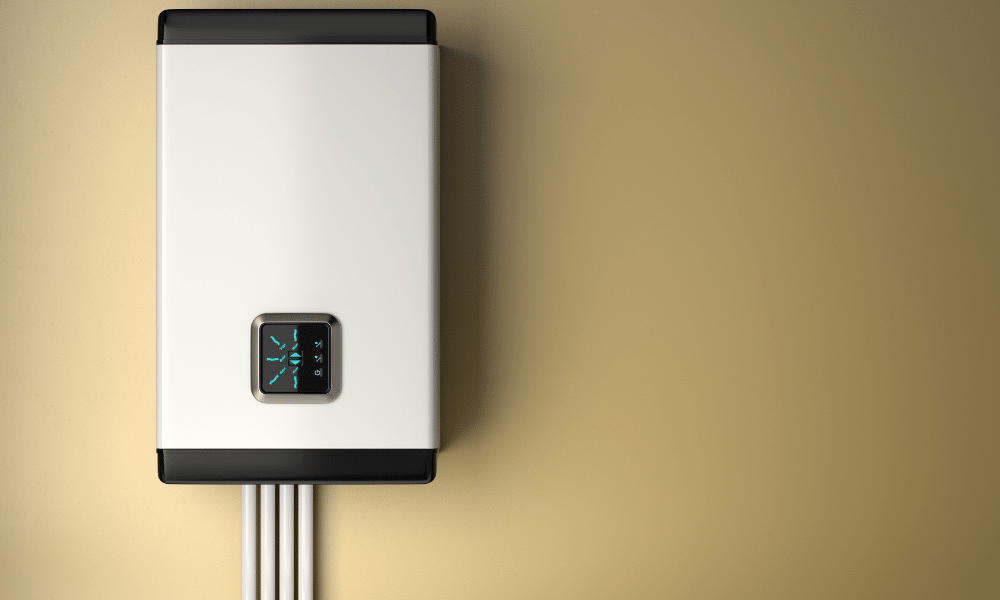
Electric boilers offer an energy-efficient heating solution that eliminates the need for burning fossil fuels throughout. With precise temperature control and ease of installation, electric boilers provide a reliable and eco-friendly option for heating your home. They convert nearly all the electricity they consume into heat, resulting in minimal carbon footprint and energy wastage. Embrace electric boilers and experience the benefits of energy efficiency and reduced carbon emissions.
Electric boilers can be a good choice for homes that meet certain criteria. Here are some of the pros and cons of electric boilers to help you decide if they are right for your home:
Pros:
Efficient: Electric boilers are typically more efficient than gas boilers, meaning they can heat your home using less energy.
Produce no emissions: Electric boilers produce no emissions, making them a good choice for people who are concerned about the environment.
Quiet: Electric boilers are typically quieter than gas boilers, so they won’t disturb you as you sleep or relax at home.
Easy to install: Electric boilers are typically easier to install than gas boilers, so you won’t have to worry about major renovations.
Cons:
More expensive to run than gas boilers: Electric boilers are typically more expensive to run than gas boilers, so you will need to factor this into your budget.
Not suitable for all homes: Electric boilers are not suitable for all homes. If your home is not well-insulated, you may find that you need to run the boiler for longer, which will increase your energy bills.
Can be more expensive to install than other types of boilers: Electric boilers can be more expensive to install than other types of boilers, such as heat pumps.
Overall, electric boilers can be a good choice for homes that meet certain criteria. However, it is important to compare the costs and benefits of electric boilers with other types of, domestic gas boilers, and oil boilers before making a decision.
Ground source heat pumps utilise the stable temperature of the ground to provide wet central heating system for your home. By circulating a mixture of water and antifreeze through underground pipes, these pumps extract heat from the earth and transfer it indoors. A ground source heat pump offers a consistent and reliable heating solution, as the ground temperature remains relatively constant throughout the year. Explore the potential of geothermal energy and consider the installation of ground source heat pumps for efficient and sustainable heating and reduce carbon emissions and greenhouse gases.
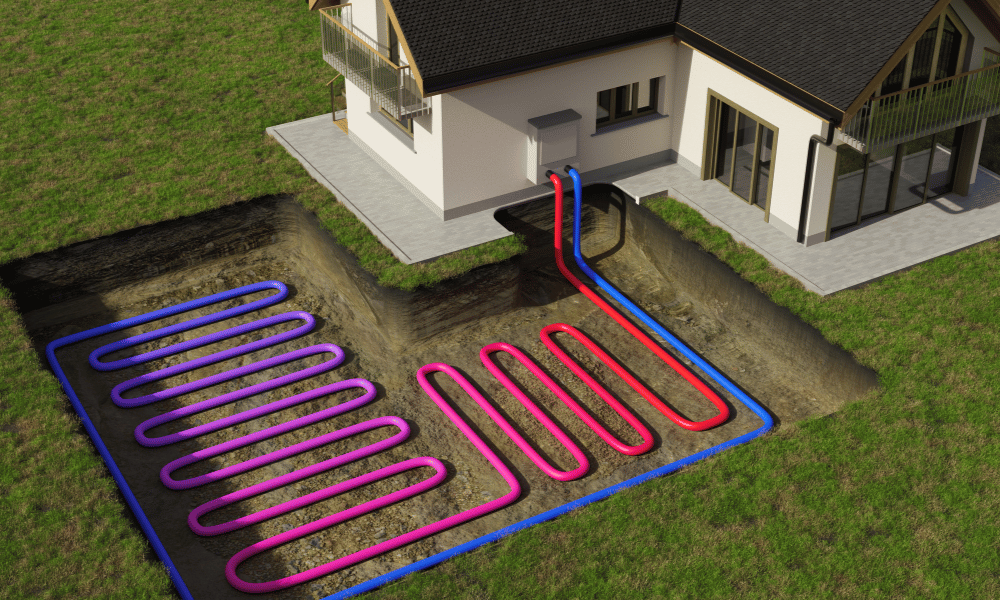
Geothermal heat pumps take the concept of ground source heat pumps a step further by tapping into the earth’s thermal energy. They use the natural heat stored in the ground or water bodies to provide low carbon heating systems, and cooling for buildings. Geothermal heat pumps and low carbon heating systems are highly efficient and can significantly reduce energy consumption compared to traditional heating systems. By using low carbon heating system harnessing the earth’s renewable energy, you can enjoy a comfortable and sustainable home environment.
Infrared heating is an alternative alternative central heating systems and solution that operates by emitting infrared radiation, which directly heats objects and surfaces in a room. Unlike traditional gas central heating and systems that warm the air, infrared heaters and infrared heating panels deliver efficient radiant heat that is quickly absorbed by people and objects. These heaters are energy-efficient and provide instant warmth, making them a practical choice for specific heating requirements. Consider the benefits of infrared heating panels for targeted heating solutions within your home.
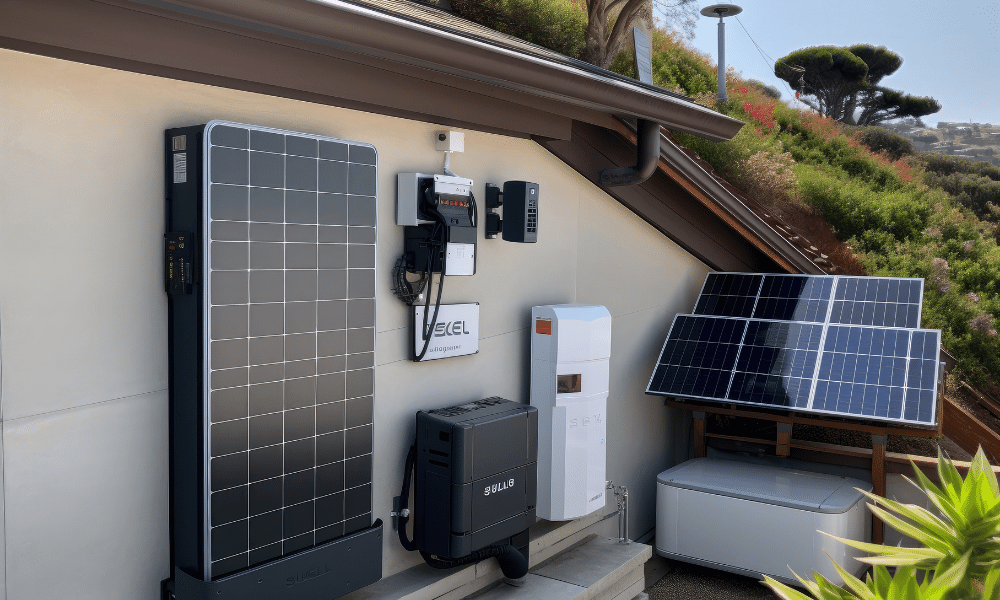
Combined Heat and Power (CHP) systems, also known as cogeneration systems, simultaneously produce heat and electricity from a single fuel source. By using solar thermal panels and using hybrid heat pumps capturing and utilising the heat that would otherwise be wasted during electricity generation, CHP systems offer high energy efficiency. They can be powered by various fuels, including natural gas, biomass, or even hydrogen in the future. Implementing a CHP system in your home not only provides sustainable heating but also contributes to overall energy savings.
In the era of smart technology, integrating intelligent heating solutions into your home can enhance energy efficiency and comfort. Smart thermostats and central heating system controls allow you to manage your heating system efficiently, adjusting temperature settings according to occupancy and preferences. These central heating systems can learn your heating patterns, optimize energy usage, and provide remote control capabilities through smartphone apps. Embrace the convenience and energy-saving potential of smart home heating solutions for a sustainable and comfortable living environment.
In conclusion, the transition to alternative heating systems is a significant step towards a greener and more sustainable future. By exploring the diverse range of options available, such as hybrid heating system as heat pumps, biomass boilers, solar thermal systems, district heating, and storage heaters, hydrogen boilers, electric boilers, and air source heat pump, and ground source heat pumps, geothermal heat pumps, infrared heating, combined heat and power systems, electric heating, and smart home heating solutions, you can find a solution that aligns with your heating needs and environmental values.
Tags: Switching to Electric.

If you are considering electric heating/electric radiators, then this guide tells you everything you need to know. Discover this modern, sustainable and economical method of heating that gives you complete control and comfort. Download Free Guide now.

*Trust Electric Heating needs the contact information you provide to us to contact you about our products and services. You may unsubscribe from these communications at any time. For information on how to unsubscribe, as well as our privacy practices and commitment to protecting your privacy, check out our Privacy Policy.
Quick installation and a 100 day warmth guarantee. Whether you’re buying one or several radiators, if our radiators don’t heat your room to a minimum of 20 degrees we will undertake to upgrade or replace the radiators free of charge.
Book your free consultation